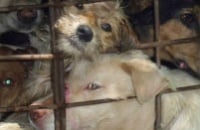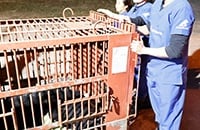Animal Asia founder appeals to Koreans to halt bile tourism
09 September 2013
At a press conference in Seoul, Animals Asia founder Jill Robinson has warned Koreans of the dangers of bear bile tourism.
Citing the Chinese city of Yanji as an example, where a large proportion of the population are ethnic Korean, the extent to which bile tourism benefits the trade was outlined.
Around 300,000 Korean tourists visit the area each year and Animals Asia’s research suggests up to 30% are likely to purchase bile from bear farms or pharmacies at extremely high prices. In South Korea itself, Asiatic black bears - more commonly known as moon bears - are protected due to their IUCN classification as “vulnerable”.
However, inward smuggling continues to occur despite South Korea laws stating that bringing in bear bile or products containing bear bile ingredients is prohibited by law.
As a result of the visit HanaTour, Korea’s largest travel agencies with over 2,200 employees, has agreed to sign a promise agreement saying they would not introduce tourists to bear farms.
Also making the pledge was the CEO of Good Tours, Mr Na Hyo-Woo, who told guests that Animals Asia had presented a serious case that deserved support. He promised, in his role as Chairman of the Fair Travel Association representing 30 agencies, to further spread the message and ensure increased awareness among tourists. He also will be raising the matter with the Head of the government Travel Authority at their next meeting.
Jill Robinson told assembled South Korean media:
“We are appealing to people not to buy a package deal that includes a visit to a bear farm or pharmacy that sells bile. Bear bile farming is horrific and sees not just disease and an agonising death for the bears, but health risks for those who consume the contaminated bile. Please be warned of the dangers - it’s illegal and insanitary and could be putting you, your family and friends at risk. Every Korean tourist who buys bile from a farm in China also makes it harder for us to end this inhumane and unnecessary practice."
Animals Asia China Director Toby Zhang added:
“Stopping bile tourism from Korea to China and Vietnam is key to stopping the bear bile industry in both countries. The dynamic of varying levels of legality between the three countries creates a situation that inflates prices and underpins the industry. In Korea we have met so many people whose beliefs reflect our own that bear bile farming must be stopped. The movement continues to grow.”
The Korea visit follows recent activity in Animals Asia in Vietnam where leaflets outlining the dangers of bile tourism have been handed out to tourists. The leaflets include warnings in Korean, Chinese, Vietnamese and English. Bear farming was originally introduced to China from North Korea and from there into Vietnam.
BACK




 5 reasons the dog meat trade must end
5 reasons the dog meat trade must end
 New year, new home for Christmas the Bear!
New year, new home for Christmas the Bear!
 Veterinary welfare training – pain management
Veterinary welfare training – pain management